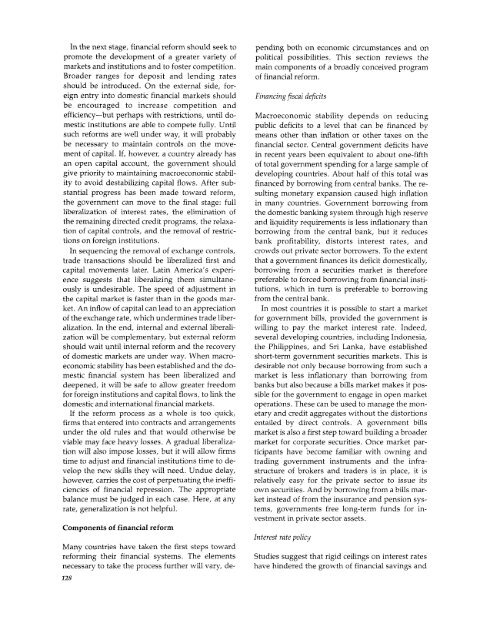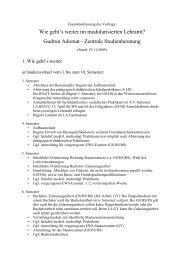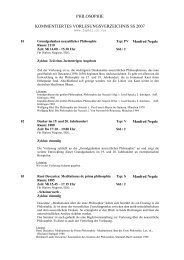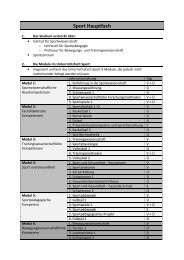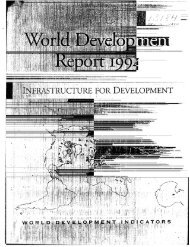Financial systems and development
Financial systems and development
Financial systems and development
Create successful ePaper yourself
Turn your PDF publications into a flip-book with our unique Google optimized e-Paper software.
In the next stage, financial reform should seek to pending both on economic circumstances <strong>and</strong> on<br />
promote the <strong>development</strong> of a greater variety of political possibilities. This section reviews the<br />
markets <strong>and</strong> institutions <strong>and</strong> to foster competition. main components of a broadly conceived program<br />
Broader ranges for deposit <strong>and</strong> lending rates of financial reform.<br />
should be introduced. On the external side, foreign<br />
entry into domestic financial markets should Financing fiscai deficits<br />
be encouraged to increase competition <strong>and</strong><br />
efficiency-but perhaps with restrictions, until do- Macroeconomic stability depends on reducing<br />
mestic institutions are able to compete fully. Until public deficits to a level that can be financed by<br />
such reforms are well under way, it will probably means other than inflation or other taxes on the<br />
be necessary to maintain controls on the move- financial sector. Central government deficits have<br />
ment of capital. If, however, a country already has in recent years been equivalent to about one-fifth<br />
an open capital account, the government should of total government spending for a large sample of<br />
give priority to maintaining macroeconomic stabil- developing countries. About half of this total was<br />
ity to avoid destabilizing capital flows. After sub- financed by borrowing from central banks. The restantial<br />
progress has been made toward reform, sulting monetary expansion caused high inflation<br />
the government can move to the final stage: full in many countries. Government borrowing from<br />
liberalization of interest rates, the elimination of the domestic banking system through high reserve<br />
the remaining directed credit programs, the relaxa- <strong>and</strong> liquidity requirements is less inflationary than<br />
tion of capital controls, <strong>and</strong> the removal of restric- borrowing from the central bank, but it reduces<br />
tions on foreign institutions. bank profitability, distorts interest rates, <strong>and</strong><br />
In sequencing the removal of exchange controls, crowds out private sector borrowers. To the extent<br />
trade transactions should be liberalized first <strong>and</strong> that a government finances its deficit domestically,<br />
capital movements later. Latin America's experi- borrowing from a securities market is therefore<br />
ence suggests that liberalizing them simultane- preferable to forced borrowing from financial instiously<br />
is undesirable. The speed of adjustment in tutions, which in turn is preferable to borrowing<br />
the capital market is faster than in the goods mar- from the central bank.<br />
ket. An inflow of capital can lead to an appreciation In most countries it is possible to start a market<br />
of the exchange rate, which undermines trade liber- for government bills, provided the government is<br />
alization. In the end, internal <strong>and</strong> external liberali- willing to pay the market interest rate. Indeed,<br />
zation will be complementary, but external reform several developing countries, including Indonesia,<br />
should wait until internal reform <strong>and</strong> the recovery the Philippines, <strong>and</strong> Sri Lanka, have established<br />
of domestic markets are under way. When macro- short-term government securities markets. This is<br />
economic stability has been established <strong>and</strong> the do- desirable not only because borrowing from such a<br />
mestic financial system has been liberalized <strong>and</strong> market is less inflationary than borrowing from<br />
deepened, it will be safe to allow greater freedom banks but also because a bills market makes it posfor<br />
foreign institutions <strong>and</strong> capital flows, to link the sible for the government to engage in open market<br />
domestic <strong>and</strong> international financial markets.<br />
operations. These can be used to manage the mon-<br />
If the reform process as a whole is too quick, etary <strong>and</strong> credit aggregates without the distortions<br />
firms that entered into contracts <strong>and</strong> arrangements entailed by direct controls. A government bills<br />
under the old rules <strong>and</strong> that would otherwise be market is also a first step toward building a broader<br />
viable may face heavy losses. A gradual liberaliza- market for corporate securities. Once market partion<br />
will also impose losses, but it will allow firms ticipants have become familiar with owning <strong>and</strong><br />
time to adjust <strong>and</strong> financial institutions time to de- trading government instruments <strong>and</strong> the infravelop<br />
the new skills they will need. Undue delay, structure of brokers <strong>and</strong> traders is in place, it is<br />
however, carries the cost of perpetuating the ineffi- relatively easy for the private sector to issue its<br />
ciencies of financial repression. The appropriate own securities. And by borrowing from a bills marbalance<br />
must be judged in each case. Here, at any ket instead of from the insurance <strong>and</strong> pension sysrate,<br />
generalization is not helpful.<br />
tems, governments free long-term funds for investment<br />
in private sector assets.<br />
Components of financial reform<br />
Interest rate policy<br />
Many countries have taken the first steps toward<br />
reforming their financial <strong>systems</strong>. The elements Studies suggest that rigid ceilings on interest rates<br />
necessary to take the process further will vary, de- have hindered the growth of financial savings <strong>and</strong><br />
12S


